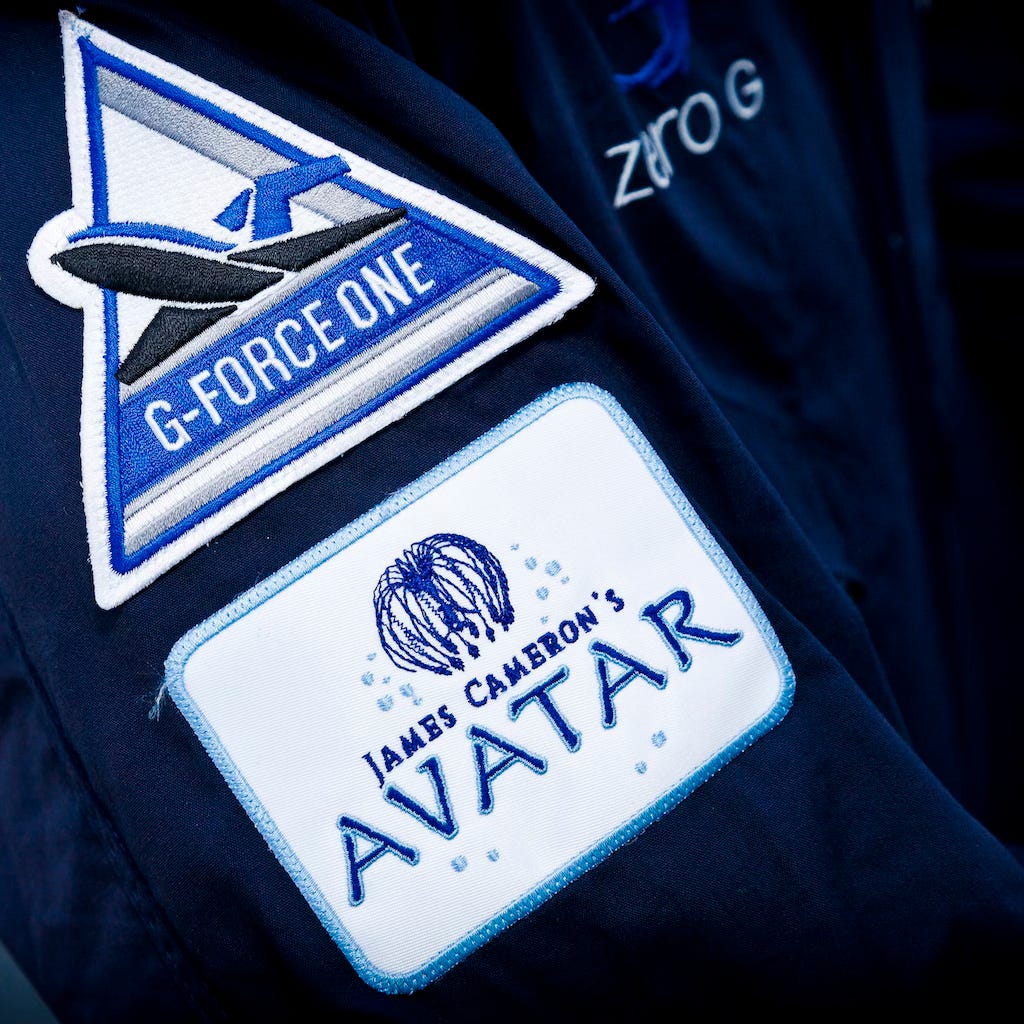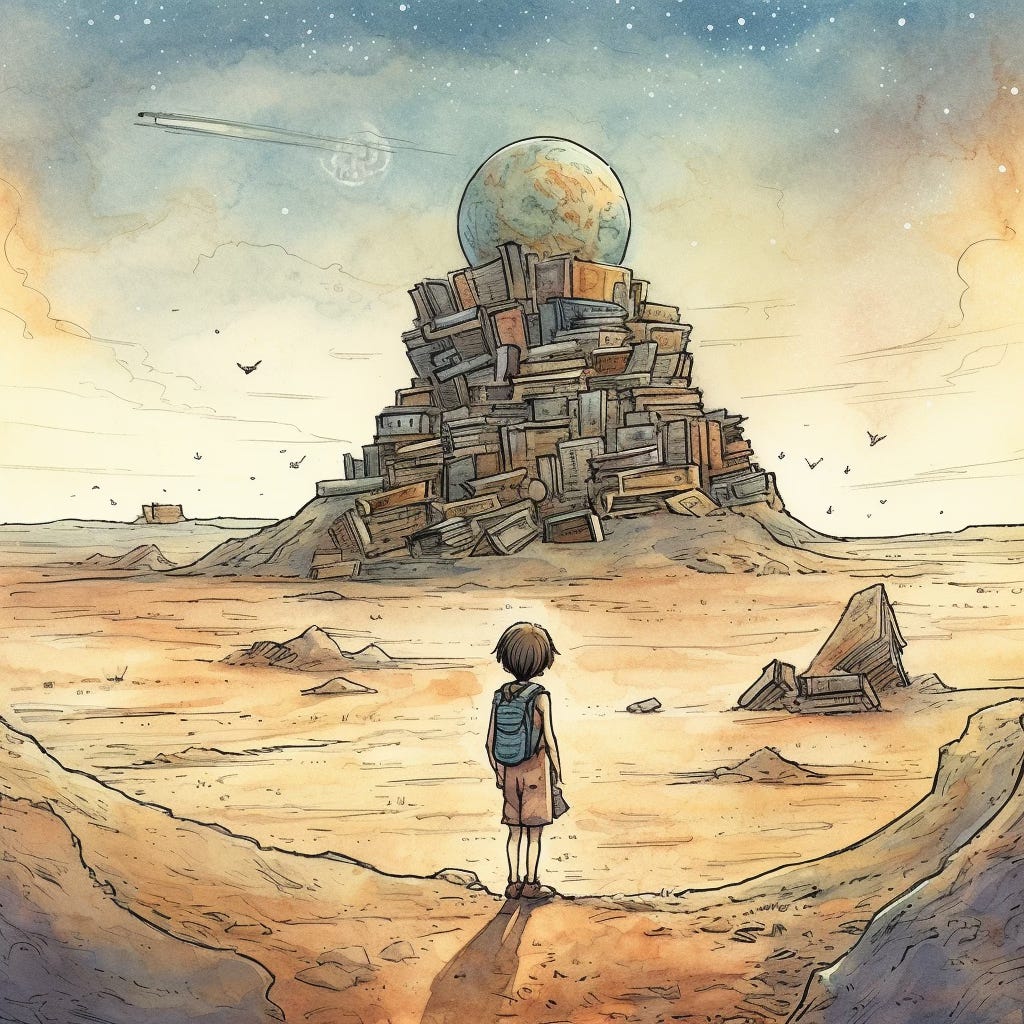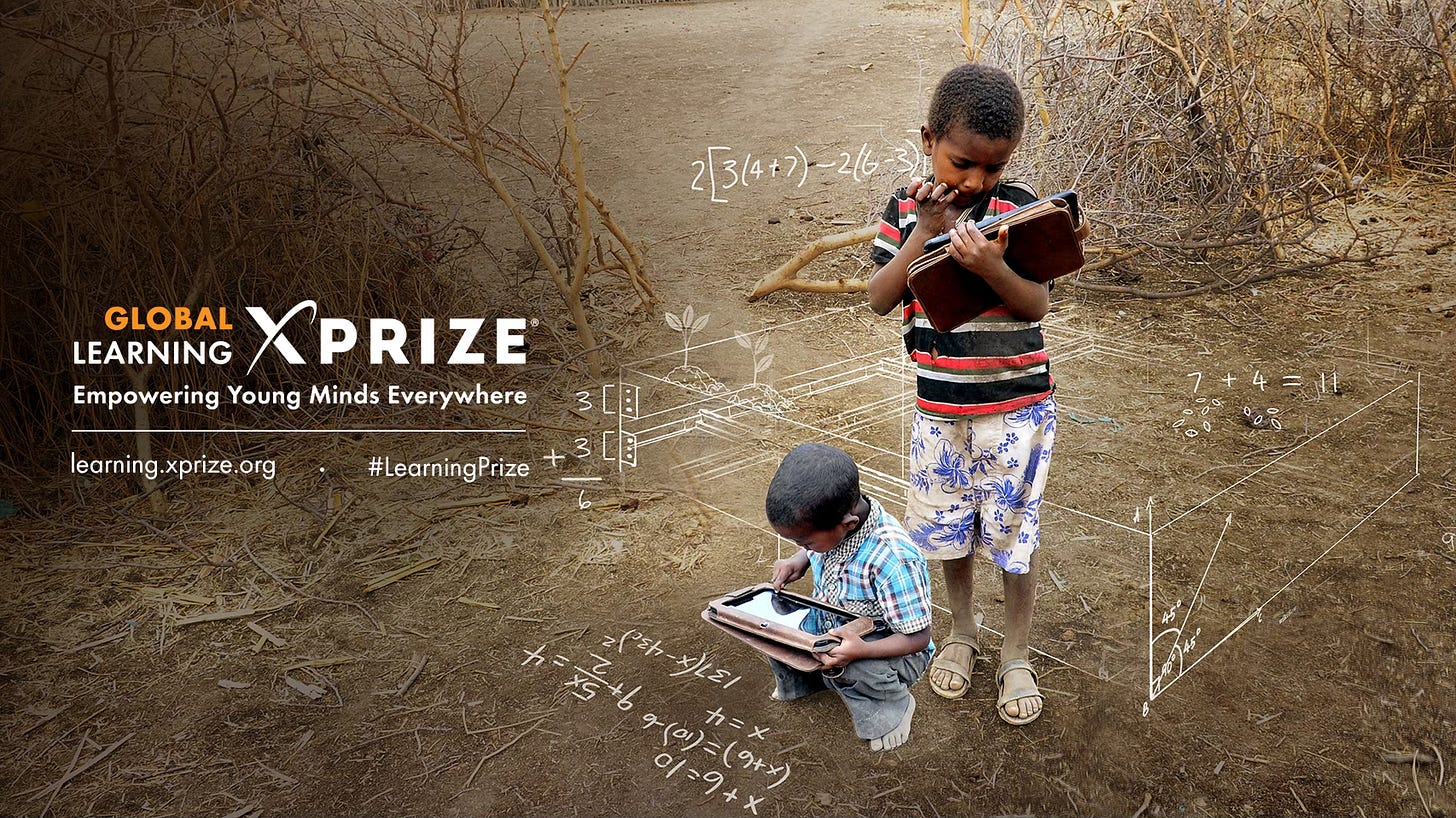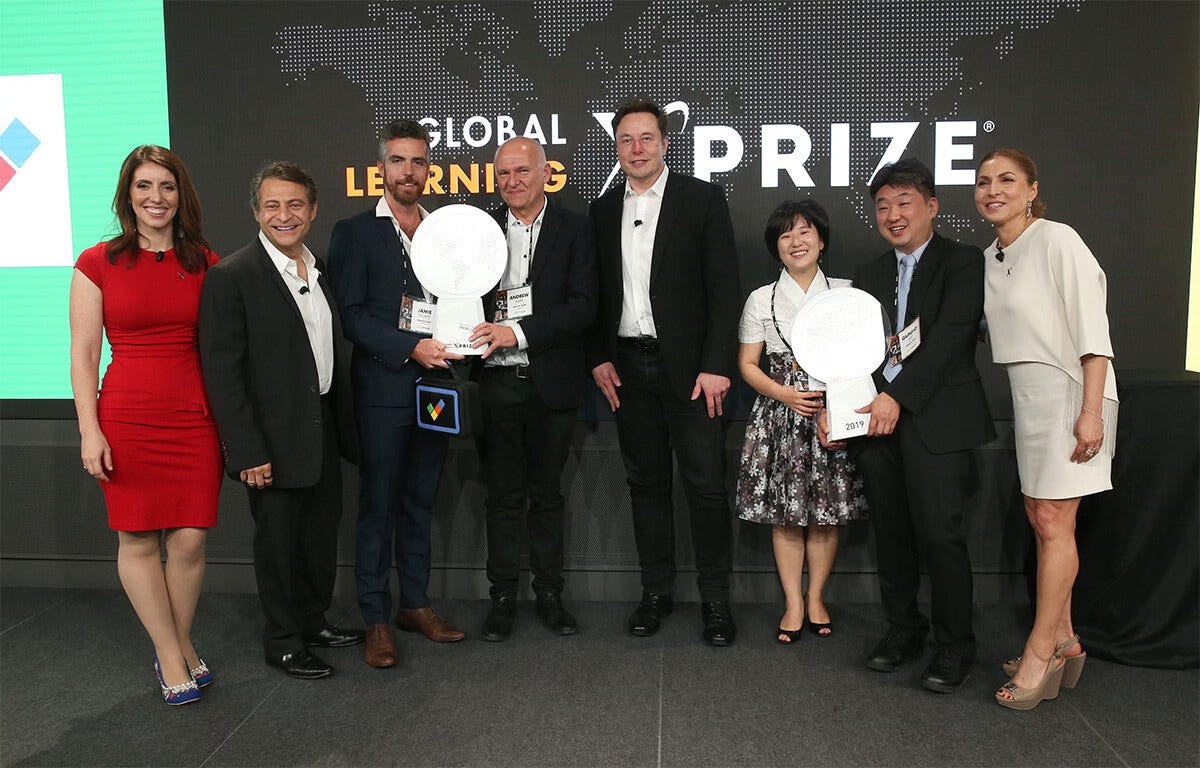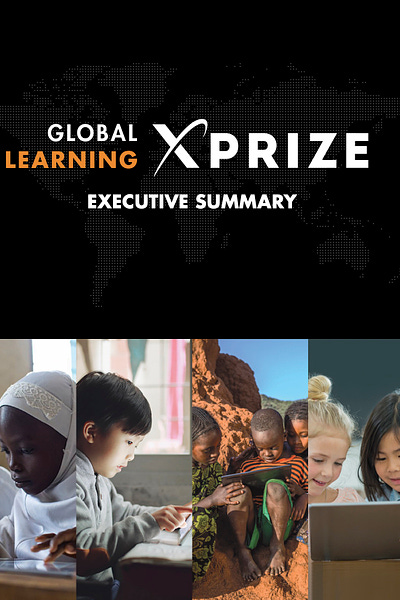Transforming Global Literacy
The Inspiring Journey of XPRIZE and the Global Literacy XPRIZE Competition
Embarking on a journey with XPRIZE has undeniably been one of the most enriching and profound experiences of my life within the realm of philanthropy. This tale, which I'm about to unfold, may captivate you for several reasons.
To begin with, the term "XPRIZE" might be an enigma to many. I must confess, upon my initial encounter with the concept, I was convinced I had stumbled upon the world's best-kept secret. Despite its significant growth since my introduction, XPRIZE remains somewhat under the radar, not yet achieving the widespread acclaim it undoubtedly deserves. This element of discovery adds a layer of intrigue to the narrative, inviting readers into an almost clandestine world of innovation and challenge.
Secondly, for those who, like myself, are perennially cheering for the underdog, there's a compelling aspect to this story. XPRIZE levels the playing field, offering those often overlooked a fighting chance to showcase their talents and contribute to global progress. It's a testament to the power of innovation, inclusivity, and equal opportunity, making the narrative not just interesting but inspiring.
Before we delve deeper, it's pertinent to note that this journey is categorized under "Technology." This is no arbitrary choice. Technology serves as the backbone of our quest, enabling us to scale innovations at a pace and breadth previously unimaginable. It is through technological advancements that we can envisage a future where the benefits of innovation reach every corner of the globe, transforming lives and protecting the planet we call home.
In sharing this journey, my aim is not just to narrate my experiences but to illuminate the pathways technology can create for philanthropy. It's about envisioning a world where every individual has the opportunity to contribute to and benefit from our collective progress. So, as we embark on this exploration together, I invite you to open your mind to the possibilities that lie at the intersection of technology and philanthropy, and how, together, we can strive towards a more equitable and sustainable future for all.
The Ansari XPRIZE: Inspiring Human Potential and Collective Ambition
In the autumnal glow of September 2010, fate handed me a ticket to an experience that was nothing short of cinematic: winning the "Fly on a ZERO-G weightless flight with James Cameron" auction on eBay. If my recollections serve me right, Tim Ferriss was the mastermind behind this auction, aiming to drum up support for a cause close to his heart. The prospect of floating in zero gravity alongside the likes of James Cameron and Tim Ferriss, all while contributing to a noble cause, was an opportunity too thrilling to pass up. This wasn't my first dance with weightlessness—I had previously shared a ZERO-G flight with Buzz Aldrin. That, however, is a tale for another day.
I didn't know it at the time, but my adventure took an unexpected turn with the arrival of an email from one Peter Diamandis. The message was a briefing memo about the flight that was slated for just a month after my winning bid, and it bore the captivating headline: "James Cameron / XPRIZE – Zero G Flight." At that juncture, Peter Diamandis was an unknown name to me, and "XPRIZE" held no more significance than an intriguing combination of letters. My excitement was solely tethered to the prospect of soaring weightlessly with luminaries like James Cameron and Tim Ferriss.
The journey to California unfolded with the anticipation of the upcoming flight. However, during the pre-flight briefing, Peter Diamandis unveiled layers to this adventure I hadn't anticipated. It was then I connected the dots: "Oh, the Ansari XPRIZE people?!" A spark of recognition flickered; I was vaguely aware of their legacy. Yet, what I hadn't grasped was the magnitude of their mission: to "inspire and empower humanity to achieve breakthroughs that accelerate an abundant and equitable future for all." The revelation was staggering. How had such a monumental endeavor flown under the radar of public consciousness?
This moment of enlightenment reshaped my understanding of the journey I had embarked upon. No longer was this just a quest for the thrill of zero gravity—it had morphed into a profound exploration of human potential and the power of collective ambition. The question that echoed in my mind was as clear as it was compelling: Why doesn't everyone know about this?
The genesis of an idea can often be as captivating as its execution, and the narrative that led to the inception of the XPRIZE Foundation is a testament to this truth. Peter Diamandis, inspired by the pioneering spirit captured in "The Spirit of St. Louis" by Charles Lindbergh, distilled a simple yet revolutionary concept for spurring innovation. Lindbergh, hardly a household name in the burgeoning field of aviation at the time, embarked on his historic flight motivated by the allure of the $25,000 Orteig Prize. This single prize not only galvanized Lindbergh's $10,000 investment but also leveraged over $400,000 from competing teams. The quest for the Orteig Prize catalyzed a 16-fold investment in an industry that was, until then, the stuff of fanciful speculation. This episode sparked a revelation in Peter: if a mere $25,000 could ignite such transformative investment and ambition, why not apply the same model to the final frontier—space? Hence, the Ansari XPRIZE was born, laying the groundwork for the broader XPRIZE Foundation.
Extending the XPRIZE Model to Education
Yet, this tale isn't solely about the thrill of weightlessness or the mechanics of a ZERO-G flight. It's about a deeper engagement with the ethos of XPRIZE. In the aftermath of the flight, Peter Diamandis shared with me his vision to extend the XPRIZE model to the domain of education. As an engineer, my mind instinctively sought parameters—how does one define the "ground" and "space" in the context of education? The challenge was to delineate a clear, achievable goal in a field as amorphous and sprawling as education. This conversation, as I recall it, was pivotal. Faced with what seemed an insurmountable challenge, my response was both incredulous and eager: "That sounds impossible, how can I help?"
This interaction underscores the essence of XPRIZE: transforming the seemingly impossible into tangible goals, spurring collective effort towards breakthroughs that once lay beyond the realm of possibility. It's a narrative not just of personal experience but of the broader impact of visionary thinking and collaborative innovation.
The serendipitous connection formed with Peter Diamandis in the wake of our shared ZERO-G experience laid the foundation for a collaborative journey that spanned the months and years to follow. By September 2011, a year after our memorable flight, I took a leap of faith into the unknown. Without delving into the specifics of financial requirements or progress benchmarks, I committed a donation aimed towards the exploratory phase of devising an XPRIZE in education. It was an act driven by a desire to be part of something greater, a testament to the belief in the transformative power of collective effort. In a subsequent update from Peter, I was informed, much to my surprise, that my contribution marked the inaugural donation towards this ambitious endeavor. This initial investment catalyzed a ripple effect, attracting sufficient matching funds to quadruple the original amount, thereby laying the groundwork for what promised to be a groundbreaking initiative.
The Birth of the Literacy XPRIZE
The process that unfolded was both exhaustive and exhilarating. Surveys, consultations with experts, brainstorming sessions, and visioneering workshops became the crucible within which the concept was refined and reshaped. Over time, this embryonic idea, initially dubbed the Education Gaming Prize, underwent a series of evolutions. It incorporated elements of coding and educational gaming, gradually morphing into a tangible yet still undefined entity. By October 2012, the initiative began to crystallize under the moniker "Literacy XPRIZE." A mere month later, the addition of "Global" to its name marked a significant milestone in its development, as the parameters for the competition were finally established. The Global Literacy XPRIZE set a bold challenge: to award the team that could most effectively elevate a group of 200 individuals from complete illiteracy to Stage 3 (Early Grade Reading Assessment) English literacy within a 90-day timeframe. Each participating team would be allotted a 200-person test group and a 90-day period leading up to the competition's conclusion, with the winning team being the one to achieve more than 75% Stage 3 literacy among its group.
This milestone represented more than just the formulation of competition guidelines; it signified the birth of a vision poised to address one of humanity's most pressing challenges—global illiteracy. Though the specifics of the competition would undergo further refinement, the essence of the Literacy XPRIZE had come alive, embodying the potential to revolutionize education and literacy on a global scale.
In 2013, the Global Literacy XPRIZE narrative took a pivotal turn with the involvement of MIT Professor Nicholas Negroponte, a visionary best known for spearheading the One Laptop per Child (OLPC) initiative. His agreement to serve as Chairman of the competition was a momentous development, signaling a significant leap forward in the quest to redefine global literacy. However, it wasn't just Nicholas's participation that marked a turning point; the addition of Matthew Keller, another OLPC veteran, to the team turned out to be even more consequential. Over the upcoming year, Matthew's expertise would prove invaluable in orchestrating the intricate logistics required to bring this ambitious prize to fruition.
April 2013 heralded a breakthrough announcement: Elon Musk committed to funding the prize purse, a generous total of $15 million. This sum was allocated between a $10 million grand prize for the overall winner and $5 million distributed among the five finalist teams engaged in fieldwork. Musk's decision to eliminate coding from the competition's criteria sparked mixed feelings. While its exclusion was lamentable to some, including myself, it was also recognized as a prudent choice. With the myriad challenges already associated with fostering literacy, introducing coding could have represented an unnecessary complication.
Global Learning XPRIZE (GLEXP)
The official unveiling of the prize, with a slight tweak in the name, took place in September 2014 at the Social Good Summit in New York City. The event highlighted the collective support of various benefactors, including the DeVos Family Foundation, Dr. Richard Merkin, Scott Hassan, the Anthony Robbins Foundation, the Econet Foundation, Suzanne West, and myself, John Raymonds. At this juncture, Elon Musk's backing was still shrouded in anonymity. Coinciding with the announcement, a crowdfunding campaign was launched with a goal of $500,000. The response was overwhelmingly positive, culminating in a total of $937,316—nearly doubling the initial target.
The journey towards the Global Learning XPRIZE (GLEXP) was characterized by rigorous selection processes and strategic partnerships. From an impressive pool of 198 teams spanning 40 countries, the finalists were chosen to undertake this monumental challenge. UNESCO stepped in as a key implementation partner, lending credibility and support to the initiative. The competition's testing phase was set to unfold in the Tanga and Arusha regions of Tanzania, with Google contributing 8,000 Pixel C tablets to support the effort. This phase, scheduled to begin in September 2017, represented a critical step towards realizing the ambitious goal of transforming illiteracy into literacy, leveraging technology and innovation to forge new pathways in education.
Envision the scene awaiting the final teams in Tanzania, a setting where technology and ambition intersect in a transformative challenge. Google's contribution of tablets was a pivotal first step, complemented by the basic infrastructure necessary to power these gateways to knowledge. The local mothers were given a simple yet crucial task: ensure the devices were charged. Beyond this, the landscape of guidance was barren. The young learners were to navigate these foreign tablets with no teachers, no traditional classrooms, and no one to answer their questions. It was a leap into the unknown, with the teams tasked to engineer software that would not just engage but educate, guiding these novices from a baseline of zero literacy. This wasn't just innovation; it was a daring venture into uncharted educational territories, relying solely on the power of technology to bridge the vast expanse between ignorance and enlightenment.
June 21, 2017, Announcement of eleven (11) Semi Finalist Teams at EdtechX Europe on June 21st at Kings Place, London. They were:
AutoCognita (Hong Kong, China & Bellingham, United States) is focused on helping students acquire core literacy and numeracy skills through a structured curriculum, active learning pedagogy and user experience-focused design.
CCI (New York, United States) is developing structured and sequential instructional programs, in addition to a platform seeking to enable non-coders to develop engaging learning content in any language or subject area.
Chimple (Bangalore, India) is developing a learning platform aimed at enabling children to learn reading, writing and mathematics on a tablet through more than 60 explorative games and 70 different stories.
Education Apps for All (Lynchburg, United States) is developing an app that aims to systematically teach the building blocks of reading while encouraging oral language development and reading comprehension.
Leap to Know (Pretoria, South Africa) is developing an app rich with culturally relevant stories that help to build learning foundations for children at different education levels.
Learn Leap Fly (Ottawa, Canada) is using social software and story-based learning to deliver a culture and language-adaptable learning platform for reading, writing, and arithmetic.
LiteracyApp.org (Kristiansand, Norway) is using exponential technologies like face recognition and machine learning to build an artificial intelligence (AI) tutor able to adapt itself to different children.
onebillion (UK/Malawi/Tanzania) is merging numeracy content with new literacy material to offer directed learning and creative activities alongside continuous monitoring to respond to different children’s needs.
RoboTutor (Pittsburgh, United States) is leveraging Carnegie Mellon's research in reading and math tutors, speech recognition and synthesis, machine learning, educational data mining, cognitive psychology, and human-computer interaction.
Kitkit School (Berkeley, United States) is developing a learning program with a game-based core and flexible learning architecture aimed at helping children independently learn, irrespective of their knowledge, skill, and environment.
The School of Games (San Francisco, United States) is creating a series of games to teach reading, writing, numeracy and speaking skills that adapt to different learning styles.
On a day marked by anticipation and transformative potential, September 17, 2017, found itself woven into the fabric of XPRIZE history during Mashable’s Social Good Summit. It was there, on a stage shared with Pete Cashmore, the visionary CEO and Founder of Mashable, that a pivotal announcement was made: five teams were awarded $1 million each ($5 million in total) to advance to the in-field testing phase of the competition. I was present in NYC, witnessing the selection of these teams, and amidst the flurry of excitement, a moment of profound clarity emerged from a simple inquiry I posed to one of the teams: "Would you be doing this without XPRIZE?" Despite their established expertise and ongoing contributions to educational technology, they confessed that the incentive of the prize was a critical catalyst for their endeavor. Their response was a resounding "No," affirming the essence of XPRIZE. It was a moment that echoed the spirit of Lindbergh's pioneering flight, highlighting how the prize was not just a reward but a beacon, illuminating paths unconsidered and unlocking doors previously unseen.
Global Learning XPRIZE Award Ceremony
The finalists, CCI, RoboTutor, Kitkit School, Chimple, and onebillion, were now tasked with the formidable challenge of field-testing their solutions, each aspiring for the coveted $10M grand prize. The journey ahead was anything but straightforward. Questions of feasibility surfaced amidst factors like malnutrition, casting shadows of doubt on the potential for success in such trying conditions. Matt Keller, closely involved with the preparations, expressed these concerns, reflecting on the myriad variables that could influence the outcome.
Yet, as the finalists embarked on their respective missions, isolated in their determination and focus, an update from the field offered a glimmer of hope. Matt Keller's insights revealed unexpected, yet profoundly impactful, outcomes: children engaging with the technology exhibited a heightened sense of dignity, evidenced by increased personal hygiene and newfound opportunities for learning among disabled children. Furthermore, the initiative fostered a reversal of traditional educational roles, with parents learning from their children. These observations underscored the competition's transformative potential, transcending mere literacy to catalyze social and behavioral change.
As we awaited the final results, the unfolding narrative was a testament to the power of innovation and the human spirit to overcome adversity. The journey of the finalists, marked by challenges and triumphs, embodied the aspiration of XPRIZE to drive significant impact through competition. The excitement was palpable, and the possibility of success, once shrouded in doubt, now shimmered with promise, suggesting that, indeed, this ambitious endeavor might just work.
On the evening of May 15, 2019, an event unfolded that was nothing short of historic within the annals of the Global Learning XPRIZE saga. Hosted in the iconic Google Playa Vista Spruce Goose Hangar, the Award Ceremony marked the culmination of years of innovation, perseverance, and collaborative genius. A groundbreaking announcement was made: teams Kitkit and onebillion emerged as joint victors, each securing a share of the $10M grand prize. This remarkable outcome symbolized the achievement of what, merely a decade prior, seemed an indefinable, let alone attainable, goal. The presence of Elon Musk, in person, added a layer of gravitas to the proceedings, underscoring the monumental significance of the event.
Adding to the evening's luster, LeVar Burton, a figure synonymous with inspiring generations through storytelling and imagination, graced the ceremony as one of the speakers. A dear friend for many years, his participation lent an air of enchantment and profound insight to the occasion. Burton's address to the assembly was more than a speech; it was a powerful testament to the boundless potential of the human spirit and the pivotal role of imagination in shaping our reality.
Burton captivated the audience with reflections that bridged the realms of science fiction and tangible innovation. Invoking the legacy of Star Trek, he reminded us of the profound impact that visionary narratives can have on the minds of the young and the young at heart. His recounting of a child, inspired by the technological marvels of a fictional universe, growing up to create the ubiquitous flip phone, served as a poignant illustration of how our dreams and stories can manifest into reality. This narrative thread wove seamlessly into the ethos of the XPRIZE competition, highlighting the transformative power of storytelling and imagination in confronting and overcoming the challenges of our world.
LeVar’s emphasis on storytelling as our species' innate gift, and the imagination as the conduit through which we manifest our aspirations, resonated deeply. It framed the accomplishments of Kitkit and onebillion not merely as technological feats but as milestones in the continuing narrative of human innovation and collective endeavor. His assertion that the work celebrated that evening was akin to "God's work" underscored the profound impact of these initiatives on a global scale, with the ultimate beneficiaries being children around the world.
The ceremony, as Burton eloquently put it, was not just an event but a celebration of the human capacity to dream, to innovate, and to fundamentally alter the course of history for the better. In honoring the achievements of all the finalists, he reminded us that regardless of the outcome on stage, the real victors were children across the globe, whose lives would be irrevocably changed for the better. This celebration was a testament to the enduring power of imagination, the importance of storytelling in our journey as a species, and the remarkable achievements that are possible when we dare to envision a brighter future for all.
(To learn more click this link or download the Executive Summary below)
The Triumph of the Underdog
As the dust settles on the remarkable journey of the Global Learning XPRIZE, I find myself at a crossroads, pondering the path forward. This odyssey has not only raised the bar in terms of what we can achieve through collective innovation and determination but has also imbued me with a profound sense of purpose and anticipation for the next challenge. The question of "What's next?" looms large, a tantalizing mystery that fuels my curiosity and drive.
The search for my next venture, akin to the Global Learning XPRIZE, is currently underway, though its shape and origin remain shrouded in uncertainty. The experience garnered from this monumental endeavor has set a lofty standard, not just in terms of the impact and scale of the projects I wish to engage with but also in the depth of commitment and vision required to catalyze meaningful change.
I am in no hurry to leap into the next project. The lessons learned, and the successes achieved have taught me the value of patience and discernment. I am guided by a deep-seated belief that the right opportunity will present itself at the opportune moment. My role, until then, is to remain open, prepared, and attuned to the possibilities that lie ahead.
This period of introspection and anticipation is not a hiatus; rather, it is a vital phase of preparation, a time to gather strength and clarity for the next grand challenge. I am driven by the conviction that the impact we can have on the world is limited only by our imagination and our willingness to pursue ambitious goals. As I look towards the horizon, eager for the next adventure, I am comforted by the certainty that when the time and opportunity align, I will be ready to embark on another journey that, hopefully, will leave an indelible mark on the global landscape of education or beyond.
Revisiting the memory of the Zero G flight brings back a whirlwind of exhilarating moments and remarkable encounters. Among these, meeting Tim Ferriss and James Cameron stands out as a highlight, each interaction etched with its own unique significance. At the time, James Cameron was deeply engrossed in the design and construction phase of the Deepsea Challenger. The opportunity to engage him in conversation about this ambitious project was nothing short of fascinating. His enthusiasm was palpable; he lit up at the chance to share insights into his journey. One detail that resonates with me is the challenge he faced in testing materials suitable for the extreme conditions of the deep sea. The scarcity of options to simulate such immense pressures made the design process not just about innovation but also about navigating the limitations of available technology. Cameron's response to my inquiry about who would pilot the submersible—"Me!," said with a beaming smile—captured his adventurous spirit and dedication.
Tim Ferriss, known for his insightful and transformative work, was equally engaging. His kindness and approachability made our interaction memorable. Elon Musk was also among us on that flight. At the time, my knowledge of him was limited to his association with Tesla. The presence of such diverse and influential figures added layers of awe to the experience.
Yet, despite the star-studded company and the thrill of zero gravity, these moments, as extraordinary as they were, ultimately pale in comparison to the journey I embarked upon with Peter Diamandis and the Global Learning XPRIZE. The endeavor not only pushed the boundaries of what is achievable in global education but also left an indelible mark on my heart and mind. It was a testament to the power of collaboration, vision, and innovation to effect meaningful change. This journey, with its challenges, triumphs, and the collective pursuit of a noble goal, stands as the most luminous beacon in my array of experiences, a vivid reminder of the impact we can have when we dare to dream and act in concert towards a brighter future.
Reflecting on the remarkable journey through the lens of the XPRIZE competitions brings us back to a fundamental and compelling theme: the triumph of the underdog. The essence of XPRIZE is its inclusive and meritocratic nature—it's a field where your background, your academic credentials, or your professional history fade into irrelevance against the brilliance of your innovation and the measurable impact of your solution. This principle is epitomized in the narrative of the Wendy Schmidt Oil Cleanup X Challenge, a poignant illustration of how unconventional paths can lead to groundbreaking innovations.
The story of a finalist team, whose lead designer was a full-time tattoo artist, is a testament to the unpredictable and diverse sources from which solutions to our most pressing challenges can emerge. The genesis of their oil cleanup solution—a conversation sparked amidst the creative process of covering an old tattoo—underscores the competition's openness to ideas from all quarters. This anecdote is not just about the serendipitous meeting of minds but also about the breaking down of barriers between seemingly unrelated worlds.
Team Vor-Tek - Wendy Schmidt Oil Cleanup X CHALLENGE
Their journey from an idea conceived in a tattoo parlor to becoming finalists in a high-stakes global challenge speaks volumes. While they may not have clinched the ultimate prize, their achievement in surpassing the existing industry standard is a victory in its own right. It embodies the spirit of the underdog—individuals or teams who defy expectations, who challenge the status quo not with their credentials, but with their capacity for innovation and problem-solving.
This narrative serves as a powerful reminder that in the arena of global challenges, it's not where you start but where you aim that defines your journey. The XPRIZE competitions, by design, champion this ethos, providing a platform where the only currency is the quality of your ideas and the potential of your solutions to effect real and measurable change. It's a celebration of the underdog spirit, proving time and again that from the most unexpected sources can come solutions that not only compete with but also surpass established norms, driving forward progress in ways previously unimaginable.
BONUS: The presence of EdTech and remote learning is more prevalent than ever. Now, it’s more necessary than ever to find solutions to help mitigate inequalities in education around the world and make a real impact for communities who lack access to basic education.
The films showcased below illustrate just how impactful remote learning can be when paired with open-source education technology that’s accessible and localized to other languages. Watch, learn, share, and make a plan for how you can bring these open softwares to your local communities. To access the technology, visit github.org/xprize.






